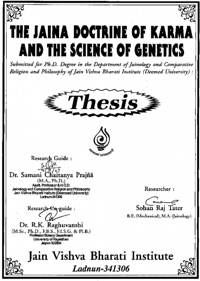Scientists decoding the human genome may persuade us to re-examine our belief in fate, predestination, free will and the law of karma. Some genes, we are told, determine our mood swing. Some predispose us to diseases, some determine how faithful we are to our companions, while others the intensity of our spirituality. If genes predetermine our behaviour, if karmic destiny is encoded in our genes, do we have a choice?
What about free will? Are we to drift, as sailer on a stream without every being able to change the course of our life? Dean Hamer who is working on the 'spirituality gene' says by exercising our free will, we could change the nature or quality of our genes. Through our effort dormant genes could get activated. For example, creativity gene can lie dormant till a person is passed her middle age. At a later stage, one might have found time and suitable circumstances to activate her dormant creativity genes.
Similarly the spirituality gene (VMAT2 or God gene) gets activated when a person feels inner need for God and devotes herself whole heartedly to spiritual pursuits. When young Vivekānañda requested Ramakṛṣṇa to pursued goddess Kali to give him wealth, the sage advised him to ask the goddess directly. Facing the goddess, prominent philosopher Vivekānañda asked for wisdom and enlightenment instead. What could have promoted a young man to desire enlightenment and not wealth? In the light of genomic findings, we may see that he was promoted to do so by the spirituality gene. [16]
 Prof. Dr. Sohan Raj Tater
Prof. Dr. Sohan Raj Tater
 Doctoral Thesis, JVBU
Doctoral Thesis, JVBU